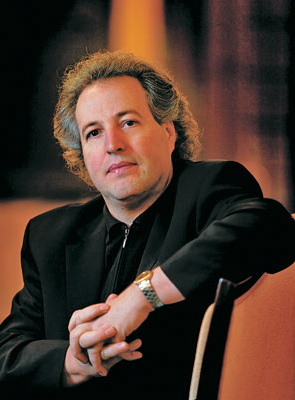Conductor Honeck brings fresh insight and illumination to familiar Dvořák

Manfred Honeck conducted the New World Symphony in music of Dvořák Sunday afternoon at New World Center..
Manfred Honeck made a welcome return to the New World Symphony this weekend in an all-Dvořák program featuring the rising German cellist Johannes Moser.
The Pittsburgh Symphony’s music director and former Vienna Philharmonic violinist brought a strong sense of Austro-German musical traditions to the orchestral academy’s young players. At Sunday’s matinee performance at New World Center, the ensemble’s corporate sound was darker, the winds and brass more autumnal and mellow in the manner of the best European orchestras.
Honeck is an expressive interpreter in the mold of Wilhelm Furtwangler. Gradations of tempo and dynamics, both minute and large, permeated his conducting of two Dvořák masterworks. Aided by the clear, bright acoustic, the conductor’s lucid performances highlighted a wealth of instrumental details that are usually obscured in orchestral fog.
Honeck’s taut, driving tempo at the outset of the Cello Concerto in B minor set the stage for a bracing performance. This was not prettified Dvořák of the pastoral variety. Although his tone is more lean than sonorous, Moser is an exciting musician with a distinctive interpretive viewpoint. His strong, whiplash attack and high-wire intensity radiated through every bar of the opening movement. Instead of the usual lyrical contrast, Moser shaped the secondary theme with an edgy forward thrust.

Johannes Moser
The cellist’s refinement, flowing line and poignancy in the Adagio provided a brief interlude before the finale. Moser’s intense playing always carried the score forward with an immediacy and power that drew the listener into the cellist’s exciting, highly personalized journey through this greatest of cello concertos. Near the conclusion he reduced his sound to a mere whisper, presaging the fiery orchestral coda.
Moser and Honeck were true collaborators, the conductor perfectly syncing the orchestral line to the cellist’s every turn. The New World’s rock-solid horns and vibrant solo clarinet took special honors in a brilliantly incisive ensemble performance.
Honeck’s version of the thrice familiar Symphony No. 9 in E minor (From the New World) emerged freshly minted, devoid of clichés or accumulated routine. After a measured introduction, the Allegro molto flew at whirlwind speed; yet there was warmth and definition in each of the movement’s three principal themes. The Largo was exquisitely shaped, the famous English horn solo assayed with the limpid beauty of a bel canto aria.
Honeck whipped up the third movement Molto vivace to the furious pace of a Czech furiant, subtly detailing brass and wind parts in the central trio episode. Dvořák’s remarkable fusion of American and Czech elements in the finale was strikingly conveyed, Honeck giving the clarinet theme space and depth of emotion.
Honeck rejuvenated one of the real warhorses of the symphonic literature by attentiveness to instrumental nuance and detail and strong accentuation of the symphony’s emotion and nationalistic fervor. This highly talented conductor deserves a return engagement soon.
Posted in Performances
One Response to “Conductor Honeck brings fresh insight and illumination to familiar Dvořák”
Leave a Comment
Mon Dec 12, 2011
at 12:04 pm
1 Comment







Posted Dec 13, 2011 at 1:42 pm by bruce
I was privileged to see the concert twice and totally agree with the review. Honeck’s attention to detail, intimate knowledge of the 9th and ability to give each instrument space made this a memorable weekend. Kudos also to the wonderful oboe player and flutist as well the great drummer, trumpets and trombone. It was world class.